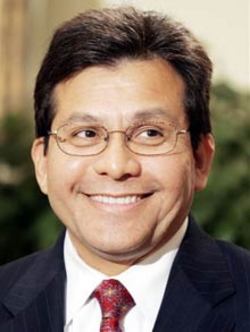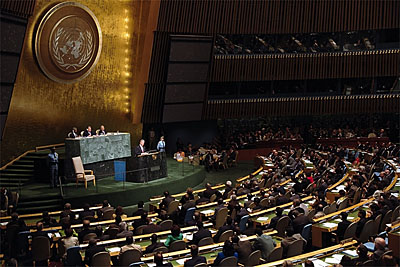In Their Own Words, He Said / He Said edition

Alberto Gonzales testifies before the Senate Judiciary Committee, 6 January 2005:
While I look forward to answering your specific questions concerning my actions and my views, I think it is important to stress at the outset that I am and will remain deeply committed to ensuring that the United States government complies with all of its legal obligations as it fights the war on terror, whether those obligations arise from domestic or international law.
These obligations include, of course, honoring Geneva Conventions whenever they apply. Honoring our Geneva obligations provide critical protection for our fighting men and women and advances norms for the community of nations to follow in times of conflict. Contrary to reports, I consider the Geneva Conventions neither obsolete nor quaint.
Alberto Gonzales reports to George W. Bush on the legal obligations imposed by the Geneva Conventions, 25 January 2002:
The consequences of a decision to adhere to what I understood to be your earlier determination that the GPW does not apply to the Taliban include the following:
Positives
- Preserves flexibility
- As you have said, the war against terrorism is a new kind of war. It is not the traditional clash between nations adhering to the laws of war that formed the backdrop for GPW. The nature of the new war places a high premium on other factors, such as the ability to quickly obtain information from captured terrorists and their sponsors in order to avoid further atrocities against American civilians, and the need to try terrorists for war crimes such as wantonly killing civilians. In my judgment, this new paradigm renders obsolete Geneva’s strict limitations on questioning of enemy prisoners and renders quaint some of its provisions requiring that captured enemy be afforded such things as commissary privileges, scrip (i.e., advances of monthly pay), athletic uniforms, and scientific instruments. …
- Substantially reduces the threat of domestic criminal prosecution under the the War Crimes Act (18 U.S.C. 2441).
- That statute, enacted in 1996 prohibits the commission of a
war crimeby or against a U.S. person, including U.S. officials.War crimefor these purposes is defined to include any grave breach of GPW or any violation of common Article 3 thereof (such asoutrages against personal dignity). Some of these provisions apply (if the GPW applies) regardless of whether the individual being detained qualifies as a POW. Punishments for violations of Section 2441 include the death penalty. A determination that the GPW is not applicable to the Taliban would mean that Section 2441 would not apply to actins taken with respect to the Taliban.- Adhering to your determination that GPW does not apply would guard effectively against misconstruction or misapplication of Section 2441 for several reasons.
- First, some of the language of GPW is undefined (it prohibits, for example,
outrages upon personal dignityandinhuman treatment), and it is difficult to predict with confidence what actions might be deemed to constitute violations of the relevant provisions of GPW.- Second, it is difficult to predict the needs and circumstances that could arise in the course of the war on terrorism.
- Third, it is difficult to predict the motives of prosecutors and independent counsels who may in the future decide to pursue unwarranted charges based on Section 2441. Your determination would create a reasonable basis in law that Section 2441 does not apply, which would provide a solid defense to any future prosecution.
…
On balance, I believe that the arguments for reconsideration and reversal are unpersuasive.
Jed Babbin in National Review Online 25 February 2004:
If wars are too important to be trusted to the generals, they are far too important to be trusted to a bunch of lawyers.

George W. Bush, Collinsville, Illinois, 5 January 2005:
I think we’re sent to Washington to solve problems, not to pass them on to future Congresses. I believe we are called to do the hard work to make our communities and quality of life a better place. And it’s hard work for some in Congress to stand up to the trial lawyers. I understand that. But all we’re asking for is fairness.




